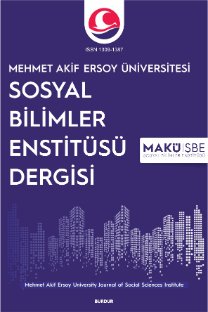How Students Perceive the Math Teacher?
Mathematics Teacher, Visual Intelligence, Students Perception
___
Açıkgöz, K. Ü. (2003). Etkili öğrenme ve Öğretme. (4. Basım). İzmir: Eğitim Dünyası Yayınları.Alkan, H., Güzel, E. B. ve Elçi, A. N. (2004). Öğrencilerin Matematiğe Yönelik Tutumlarında Matematik Öğretmenlerinin Üstlendiği Rollerin Belirlenmesi. XIII. Ulusal Eğitim Bilimleri Kurultayı, 6-9 Temmuz 2004, Malatya: İnönü Üniversitesi.
Bümen, N. T. (2002). Okulda Çoklu Zekâ Kuramı. Ankara: PegemA Yayıncılık.
Cornell, C. (2000). Matematikten Nefret Ediyorum. (Çev: Nilüfer Eyüboğlu). Yaşadıkça Eğitim, 65, 1522.
Dede, Y. ve Argün, Z. (2004). Öğrencilerin Matematiğe Yönelik İçsel Ve Dışsal Motivasyonlarının Belirlenmesi. Eğitim ve Bilim, 29 (134), 49-54.
Demirel, Ö., Başbay, A. ve Erdem, E. (2006). Eğitimde Çoklu Zekâ Kuramı Ve Uygulama. Ankara: PegemA Yayıncılık.
Doğru, S.S.Y., Turcan, A.İ., Arslan, E. ve Doğru, S. (2006). Çocukların Resimlerindeki Aileyi Tanılama Durumlarının Değerlendirilmesi. Selçuk Üniversitesi Sosyal Bilimler Enstitüsü Dergisi,15, 223236.
Gardner, H. (1983). Frames of mind: The theory of multiple intelligences. New York: Basic.
Hays, P. A. (2004). Case study research. In K. de Marrais and S. D. Lappan (Eds.), Foundations for research: Methods of inquiry in education and the social sciences (pp. 217-234). Mahwah, NJ: Lawrence Erlbaum Associates.
Kuzu, T. S. (2003) Eğitim-Öğretim Ortamında Etkili Sözel İletişim. Milli Eğitim Dergisi, 158. http://yayim.meb.gov.tr/dergiler/158/kuzu.htm adresinden 13 Ocak 2009 tarihinde indirilmiştir. MEB (2005). İlköğretim Matematik Dersi (1–5. Sınıf) Öğretim Programı. Ankara: Ders Kitapları Müdürlüğü Yayınevi.
Murat, M., Özgan, H. ve Arslantaş, H. İ. (2005). Öğretmen Adaylarının Öğretim Elemanlarının Empatik Tutumlarına İlişkin Algıları İle Ders Başarıları Arasındaki İlişki. Milli Eğitim Dergisi, 168. http://yayim.meb.gov.tr/dergiler/168/index3-arslantas.htm adresinden 13 Ocak 2009 tarihinde indirilmiştir.
Patton, M. Q. (1990). Qualitative evaluation and research methods (2nd ed.). Newbury Park, CA: Sage Publications, Inc.
Senemoğlu, N. (2001). Öğrenci Görüşlerine Göre Öğretmen Yeterlilikleri. Eğitimde Yansımalar: VI. 2000 Yılında Türk Milli Eğitim Örgütü ve Yönetimi, 11-13 Ocak 2001, Ankara: Hüseyin Hüsnü Tekışık Eğitim Araştırma Geliştirme Vakfı.
Taşdemir, C. (2009). İlköğretim İkinci Kademe Öğrencilerinin Matematik Dersine Karşı Tutumları: Bitlis İli Örneği. Dicle Üniversitesi Ziya Gökalp Eğitim Fakültesi Dergisi, 12, 89-96.
Tıraş, S. (1999). Öğrenme-Öğretme Açısından Matematik Öğretmenlerinin Yeterliliği Ve Etkili Olma Düzeyleri. D.E.Ü. Buca Eğitim Fakültesi Dergisi, Özel Sayı 11.
URL-1. Çoklu Zekâ Kuramı. http://www.bilgicik.com/tag/gorsel-zeka/ adresinden 3 Ocak 2009 tarihinde indirilmiştir.
Ünlü, E. (2007). İlköğretim Okullarındaki Üçüncü, Dördüncü Ve Beşinci Sınıf Öğrencilerinin Matematik Dersine Yönelik Tutum Ve İlgilerinin Belirlenmesi. Dumlupınar Üniversitesi Sosyal Bilimler Dergisi, 19, 129-148.
White, R. & Gunstone, R. (1992). Probing understanding. London: Falmer Press
- Yayın Aralığı: 4
- Başlangıç: 2009
- Yayıncı: Burdur Mehmet Akif Ersoy Üniversitesi Sosyal Bilimler Enstitüsü
Öğretmenlerin Pedagojik Yeterlilikleri
Postmodernizmin Eğitim Denetimine Uygulanabilirliği
5-8 Yaş Aralığındaki Çocuklarda Stereotip (Klişe Resim) Kullanımı
Resmî Belgelerde Afyon-Antalya Demiryolu Hattı Projesi (1924-1942)
Türkiye Antropolojisinin Tarihçesi ve Gelişimi Üzerine
Britanya'da Liberteryen Feminizm, 1860-1910 (Çeviri Makale)
Dergi Kapağı, Yayın Kurulu ve İçindekiler
Yetişkin Eğitimcisi Öğretmenlerin Tükenmişlik ve Mesleki Yetkinliklerinin İncelenmesi
Türkçe Öğretmeni Adaylarının Dinleme Stillerinin Çeşitli Değişkenler Açısından Değerlendirilmesi
